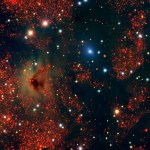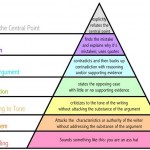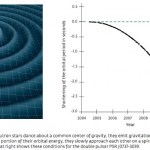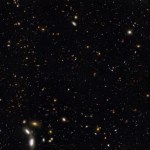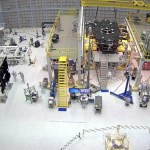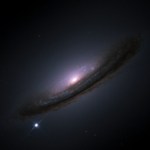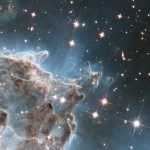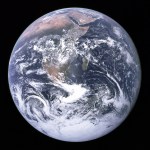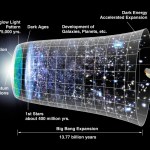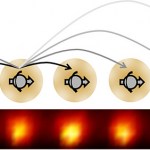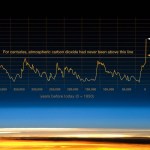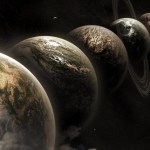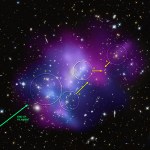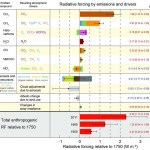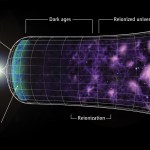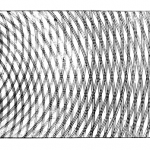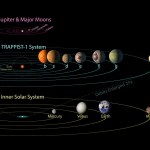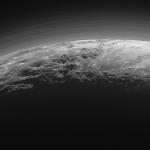
"Things need not have happened to be true. Tales and adventures are the shadow truths that will endure when mere facts are dust and ashes and forgotten." -Neil Gaiman
Wherever we look in the night sky, we don't just observe the background sources of light shining our way, but also the effects of all the matter in between those distant sources and our eyes. Since all of that inbound light needs to pass through a portion of the Milky Way on its way to our eyes, it's vital that we understand how that light is distorted by our own galaxy. That means we need an understanding of the dust in our own…
"What I find cool about being a banned author is this: I'm writing books that evoke a reaction, books that, if dropped in a lake, go down not with a whimper but a splash." -Lauren Myracle
It's been an interesting week unlike any other. Sure, we've had our usual slew of daily, fascinating articles here at Starts With A Bang, and like always, you've had a lot to say about them. Here's everything that's gone down:
How bright is the Earth as seen from the Moon? (for Ask Ethan),
Ten incredible pictures that showcase astronomy's future (for Mostly Mute Monday),
Does dark matter…
"It is only through labor and painful effort, by grim energy and resolute courage, that we move on to better things." -Theodore Roosevelt
Energy is a fundamental property of nature, and yet it’s also one of the most purely understood phenomena from a conceptual point of view. Some objects have energy inherently, such as in the form of rest mass. Other types of energy include binding energy, which is negative, and kinetic energy, which is the energy of motion. Regardless of the form it appears in, energy cannot exist without being attached to some other physical phenomenon.
As two neutron…
"The creation of something new is not accomplished by the intellect but by the play instinct acting from inner necessity. The creative mind plays with the objects it loves." -Carl Jung
13.8 billion years ago, the Universe as we know it came into existence. Today, the part we can observe is 46 billion light years in radius, having grown tremendously thanks to the expansion of the Universe. But if we extrapolate that backwards, we find that the Universe couldn’t have been infinitely small at the moment of its birth, but rather was a finite size at all finite times.
The size of the Universe (y-…
“For me, it is far better to grasp the Universe as it really is than to persist in delusion, however satisfying and reassuring.” -Carl Sagan
The President of the United States just released his proposed budget for the next fiscal year, and there are some big losers in the scientific world. The EPA, the NIH, NASA Earth Science and many other organizations that exist for the benefit of America and all of humanity are poised to lose a significant amount of federal funding. This doesn't simply affect the scientists who lose their jobs.
A significant fraction of the scientists and engineers…
“Without these supernova explosions, there are no mist-covered swamps, computer chips, trilobites, Mozart or the tears of a little girl. Without exploding stars, perhaps there could be a heaven, but there is certainly no Earth.” -Clifford A. Pickover
One of the most sobering cosmic truths is that every star in the Universe will someday run out of fuel and die. Once its core fuel is exhausted, all it can do is contract under its own gravitational pull, fusing heavier and heavier elements until it can go no further. Only the most massive stars, capable of continuing to fuse carbon (and even…
"Dark matter or invisible element?
You decide." -Toba Beta
The dark matter wars rage on and on, with both sides -- those in favor of modifying gravity and those in favor of adding an additional mass component to the Universe -- claiming victories for their own side and defeat for the other. But one piece of evidence, hitherto elusive, might finally hold the key to distinguishing one from the other: early, young, less-evolved galaxies. Billions of years ago, not as much dark matter had fallen into the inner portions of galaxies, meaning that the outer portions of rotating spirals should…
"With the Hubble telescope and all the other things that are out there, I believe something would have come through. Today, I really believe we are unique." -Mark Goddard
Want to identify where stars are forming (or about to form) in the Universe? We’ve got no problem using visible light, which reveals unambiguous signatures associated with newborn stars. But if you want to view those stars themselves, or the processes occurring within the nebula where they’re being born? You have to go to infrared light.
Taken in infrared light, the image shows the dense column and the surrounding greenish-…
"Science and religion are both the same thing. They're there; they're life. If it's not science, it's not a fact." -Chuck Berry
We always take pride in what we put out into the world here at Starts With A Bang, and I like to think that all of you take that same pride in everything you do. Before we get into anything else, I have some sad news to share with you: one of our long-time commenters, known here as MandoZink, has died of cancer. (He also commented elsewhere as BeyondApsis, if you knew or encountered him elsewhere.) His real name was Ron. He was so curious about everything; he loved…
"I put up my thumb and shut one eye, and my thumb blotted out the planet Earth. I didn't feel like a giant. I felt very, very small." -Neil Armstrong
The full Moon is undoubtedly bright. As viewed from the Earth’s surface, it’s the second brightest object of all, after the Sun, and is more than 1,500 times brighter than Venus. In fact, the full Moon is over 40 times brighter than the entire rest of the night sky combined, and can outshine even a big city when seen right next to one.
The rising full Moon and the city of Chicago, as viewed over Lake Michigan from Northwestern University's…
“We are told to let our light shine, and if it does, we won’t need to tell anybody it does. Lighthouses don’t fire cannons to call attention to their shining- they just shine.” -Dwight L. Moody
The farther away in space we look, the farther back in time we’re seeing. Light arriving from a star ten light years away is ten years old; light that took a billion-year journey from a distant galaxy is a billion years old. If we look out today at the most distant light we can see, we discover that it originates from the Big Bang itself: the Cosmic Microwave Background, or CMB.
The timeline of our…
"Every particular in nature, a leaf, a drop, a crystal, a moment of time is related to the whole, and partakes of the perfection of the whole." -Ralph Waldo Emerson
When you think of crystals, you likely think of an interlocked, repeating lattice of atoms or molecules. That’s exactly what a conventional crystal is. But recently, there’s been an exciting new idea, first proposed by Frank Wilczek in 2012: that it would be possible to create a time crystal, an entirely new class of system.
Phase diagram of the discrete time crystal as function of Ising interaction strength and spin-echo pulse…
"Greenhouse gases are the second most important factor for climate, after the Sun." -Syukuro Manabe
In 1967, a groundbreaking paper in climate science was published, detailing the inputs and feedbacks for the first accurate climate model. You don’t have to look far to find contentions that climate models are wrong, inaccurate and unreliable: 8 of the first 10 results on google state it. Yet if you look at the science, the original model, even at age 50, does a remarkable job of getting things right.
The increased emission of greenhouse gases, notably CO2, can have a massive impact on Earth's…
"As an analogy one can imagine an intelligent amoeba with a good memory. As time progresses the amoeba is constantly splitting, each time the resulting amoebas having the same memories as the parent. Our amoeba hence does not have a life line, but a life tree." -Hugh Everett
We only have the one Universe, despite all the quantum possibilities out there. We have to accept that, at a fundamental level, the Universe is indeterminate, and that the act of measuring -- or otherwise making a quantum decision -- selects which quantum path our Universe takes. But according to the many-worlds…
"On a cosmic scale, our life is insignificant, yet this brief period when we appear in the world is the time in which all meaningful questions arise." -Paul Ricoeur
When it comes to the largest bound cosmic structures, it doesn’t get any bigger than galaxy clusters. Unless, that it, you consider when multiple galaxy clusters merge together. Located at the intersections of cosmic dark matter filaments, smaller clusters flow into the larger clusters located at such a nexus. When we get very lucky, colliding clusters can be seen.
The combination of radio and X-ray data reveal background, lensed…
“When you are joyous, look deep into your heart and you shall find it is only that which has given you sorrow that is giving you joy. When you are sorrowful look again in your heart, and you shall see that in truth you are weeping for that which has been your delight.” -Khalil Gibran
Another incredible week has gone by here at Starts With A Bang! If you didn't get a chance to catch me in Jacksonville, don't fear; I'll be at MidSouthCon in Memphis, Tennessee in just a little over a week. Catch me there! Our Patreon campaign is really taking off, and with the new rewards…
"The Universe is expanding the way your mind is expanding. It's not expanding into anything; you're just getting less dense." -Katie Mack
It's a thing of scientific beauty that we've not only been able to determine that the Universe is expanding, but that we've been able to measure the rate of expansion so incredibly well. To better than 90% uniformity, we've determined the expansion rate in all directions and going back billions of years, allowing us to determine what's in the Universe, how that's changed over time, and what its fate is. It's one of the most remarkable achievements of modern…
“He who loves practice without theory is like the sailor who boards ship without a rudder and compass and never knows where he may cast.” -Leonardo Da Vinci
For centuries, Newton’s theoretical predictions were as unassailable as physics got. His ideas about mechanics, gravitation and optics passed test after test after test. Yet around the dawn of the 19th century, one class of observations appeared to run counter to his assertions: light appeared to exhibit a wave-like nature. The phenomena of diffraction and interference could not be well-explained by a corpuscular theory of light.
The…
"Laws of nature mixed with evolutionary/historical contingencies allow for a range of diversity... [t]hat diversity, within the laws of nature, when I step back a bit from the desk or the computer, still surprises me to no end." -Adrian Lenardic
When it comes to the habitability of a planet, there are a lot of assumptions that we make. All of them boil down to, at some level or other, how Earth-like this world is. This is reflected in our language: terms like “super-Earth” or “habitable zone” showcase this inherent bias. Yet the vast majority of stars that are out there aren’t Sun-like,…
"One should not need a teleportation device to decide whether a newly discovered object is a planet." -Jean-Luc Margot
It was a harsh lesson in astronomy for all of us in 2006, when the International Astronomical Union released their official definition of a planet. While the innermost eight planets made the cut, Pluto did not. But given the discovery of large numbers of worlds in the Kuiper belt and beyond our Solar System, it became clear that we needed something even more than what the IAU gave us.
This diagram compares the sizes of the newly-discovered planets around the faint red star…
